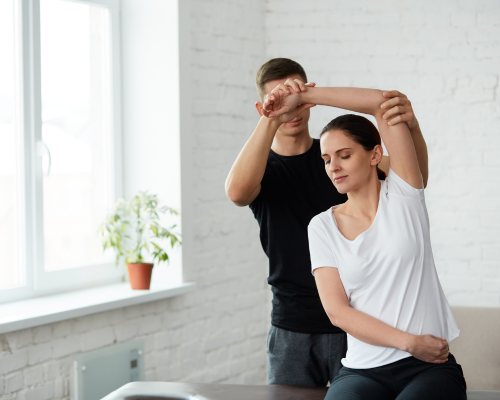Post-Stroke Rehabilitation

Post-Stroke Rehabilitation: A Path to Recovery
At Manoshanti Neuropsychiatry Clinic, we are dedicated to supporting stroke survivors through their recovery journey. Post-stroke rehabilitation plays a critical role in restoring physical function, improving independence, and enhancing quality of life. With our personalized care and specialized therapies, we aim to help each individual regain as much function as possible and return to their daily routines with confidence.
What is Post-Stroke Rehabilitation?
Post-stroke rehabilitation is a comprehensive process designed to help individuals recover from the physical, cognitive, and emotional challenges that arise after a stroke. The goal of rehabilitation is to restore independence, improve quality of life, and support individuals in regaining the skills needed for daily living.
Rehabilitation usually begins as soon as the patient is stable and can continue for weeks, months, or even years, depending on the severity of the stroke and the individual’s recovery progress.
Why is Post-Stroke Rehabilitation Important?
- Recovery of Function: Rehabilitation helps to regain lost motor functions such as movement, speech, and coordination.
- Improved Independence: The goal is to reduce dependency on caregivers and help individuals resume daily activities.
- Enhanced Quality of Life: Rehab helps stroke survivors engage in meaningful activities and improves emotional well-being.
- Prevention of Complications: Rehabilitation reduces the risk of complications such as muscle weakness, joint contractures, and further strokes.
Common Challenges After a Stroke
The effects of a stroke vary widely, and individuals may experience different challenges based on the location and extent of the brain damage. These may include:
- Physical impairments: Weakness, paralysis, or coordination problems, often on one side of the body.
- Speech and Language difficulties: Trouble with speaking, understanding speech, or swallowing.
- Cognitive changes: Memory problems, difficulty concentrating, or confusion.
- Emotional and psychological challenges: Depression, anxiety, and emotional lability (mood swings).
Components of Post-Stroke Rehabilitation
At Manoshanti Neuropsychiatry Clinic, we offer a multidisciplinary approach to post-stroke rehabilitation, addressing all aspects of recovery. Our rehabilitation program includes:
Physical Therapy
Physical therapy focuses on improving mobility, balance, strength, and coordination. Specialized exercises and techniques help patients regain physical function, reduce the risk of falls, and improve overall motor skills.
Occupational Therapy
Occupational therapy helps patients regain the skills needed for daily activities like eating, dressing, bathing, and grooming. Therapists work to increase independence by teaching adaptive techniques and providing assistive devices when necessary.
Speech and Language Therapy
For patients with speech, language, or swallowing difficulties, speech therapy helps to restore communication abilities and address any issues with swallowing. Techniques are tailored to the individual’s needs, and family members are often trained in supportive communication strategies.
Cognitive Rehabilitation
Cognitive therapy addresses challenges such as memory, concentration, and problem-solving. This helps stroke survivors rebuild cognitive functions and regain the mental sharpness necessary for independent living.
Emotional Support and Counseling
Psychological counseling is essential in helping stroke survivors cope with the emotional and mental changes after a stroke. Our clinic provides support for anxiety, depression, and other emotional struggles, ensuring the individual and their family receive the mental health care they need.
Speech Swallowing Therapy
In cases where a stroke has affected swallowing, our specialists help patients regain their ability to swallow food and liquids safely. This therapy reduces the risk of choking and improves the patient’s overall nutritional intake.
The Role of Family and Caregivers
Family members and caregivers play a vital role in the rehabilitation process. We involve family in the rehabilitation plan, providing education on how they can assist with daily activities, reinforce therapy exercises, and offer emotional support. Caregivers are often given training on how to manage daily challenges and improve the patient’s quality of life.
Rehabilitation Goals
The primary goal of post-stroke rehabilitation is to help the individual regain as much function as possible. This includes:
- Maximizing Physical Function: To improve strength, mobility, and coordination.
- Restoring Independence: To help patients perform daily activities without assistance.
- Enhancing Communication: To assist with speech, language, and cognitive skills.
- Emotional Well-being: To address psychological challenges like depression and anxiety.
Why Choose Manoshanti Neuropsychiatry Clinic for Post-Stroke Rehabilitation?
At Manoshanti Neuropsychiatry Clinic, we take a holistic approach to stroke rehabilitation. Our experienced team of specialists works closely with patients and their families to create a personalized rehabilitation plan that suits the specific needs of each individual. We emphasize the importance of a supportive environment, continuous care, and realistic goals to maximize recovery.
